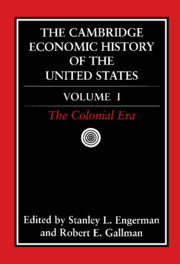Book contents
- Frontmatter
- 1 The History of Native Americans from Before the Arrival of the Europeans and Africans Until the American Civil War
- 2 The African Background to American Colonization
- 3 The European Background
- 4 The Settlement and Growth of the Colonies: Population, Labor, and Economic Development
- 5 The Northern Colonies: Economy and Society, 1600–1775
- 6 Economic and Social Development of the South
- 7 Economic and Social Development of the British West Indies, from Settlement to ca. 1850
- 8 British Mercantilist Policies and the American Colonies
- 9 The Revolution, the Constitution, and the New Nation
- Bibliographical Essays
- References
8 - British Mercantilist Policies and the American Colonies
Published online by Cambridge University Press: 28 March 2008
- Frontmatter
- 1 The History of Native Americans from Before the Arrival of the Europeans and Africans Until the American Civil War
- 2 The African Background to American Colonization
- 3 The European Background
- 4 The Settlement and Growth of the Colonies: Population, Labor, and Economic Development
- 5 The Northern Colonies: Economy and Society, 1600–1775
- 6 Economic and Social Development of the South
- 7 Economic and Social Development of the British West Indies, from Settlement to ca. 1850
- 8 British Mercantilist Policies and the American Colonies
- 9 The Revolution, the Constitution, and the New Nation
- Bibliographical Essays
- References
Summary
Mercantilism was the guiding doctrine behind the attempts of regimes and peoples of the early modern Atlantic World to organize their economic existence. The aim of mercantilism was to structure the financial foundation of the nation-state – the emerging postmedieval governmental mode that rapidly replaced feudal localism in northern and western Europe after the mid-fifteenth century – so that the state could survive and prosper. Nationalism held the promise of political stability and a better life for all, a considerable improvement over the chaos of an earlier era. Mercantilist policies were thus meant to be the economic means to larger political and social ends.
Like similar economic belief systems – socialism and capitalism, for instance – mercantilism had its faithful few and its querulous many. Nevertheless, all of early modern Europe recognized and conformed, in various degrees, to the doctrines of mercantilism. It became “the unchallenged assumption that … government had the right and responsibility to regulate economic activities in the interest of the common good.” Mercantilism attracted a following because it seemed to work. Relative to the earlier era, there was more peace and greater prosperity. Yet the success of the nation-states of early modern Atlantic Europe encouraged dissenters as well as the faithful. Inherent in a system that promised all a greater good – and more goods – was the potential that, in its success or in its failure, it might encourage the expression of alternative voices and other doctrines.
- Type
- Chapter
- Information
- The Cambridge Economic History of the United States , pp. 337 - 362Publisher: Cambridge University PressPrint publication year: 1996
References
- 3
- Cited by



